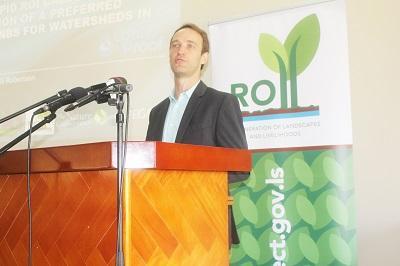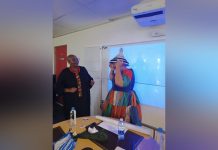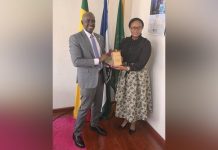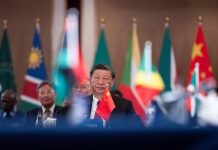Africa-Press – Lesotho. The Ministry of Environment and Forestry through the regeneration office (Roff) held a two day workshop, at Lancer’s Inn Hotel last week, with the aim of building nature based strategies on the use and value of natural resources and sustainability.
These workshop’s aim was to capture the essence of developments and trends in biophysical modeling and waterproof technologies, fostering knowledge exchange and collaboration among professionals in these dynamic fields.
Present at the workshop were different management representatives from WASCO, FAO and Renoka. The engagement manager at Nature for Water facility, Mr.
Guy Robertson indicated that Lesotho is definitely in need of technical assistance when it comes to taking care of their water and seeing to it that there is sustainability in the eco-system.
“By combining both theoretical knowledge with practical skills for both the Biophysical Modelling and Waterproof, our office aims to empower participants with valuable insights and expertise in their respective fields.
But with Lesotho we are going to educate you on how to enhance and sustain water infrastructure and support ROLL in the developments they are about to make”, he said.
Moreover, he stated that projects like this contribute to the development of new technologies and strategies which address challenges in fields like Agriculture and Conservation. He also specified that Lesotho losses about 2% of top soil due to soil erosion yearly.
Adding that it was crucial for Basotho to understand the impacts of losing such an amount and to question where all of the soil eroded ends up at, “since we have identified the problem, I believe it will be much easier to come up with solutions regarding the whole issue”, said Robertson.
He concluded by urging those present at the meeting to convince the government that investing in the Biophysical modelling and waterproof project is not a waste of resources but will ensure the growth and sustainability of water.
Adding that the project will also help in the purification of water without spending much money on it. “As technology continues to advance, biophysical modeling becomes increasingly sophisticated, allowing researchers to tackle complex biological questions and contribute to advancements in scientific knowledge and innovation.
And it is through such innovations we can improve our economy,” he said. Mr. Lechesa from Roll said that the introduction of these new model might just be what they need, since other models used in the past failed, adding that it seems the model will ensure return on investments within a period of 5 years.
He stated that most Basotho do not respect this projects at all, since they have a hand in most projects failing, emphasizing that they lack knowledge on how important rangelands and landscapes are to the country, however he believes that with the introduction of this project communities will need to be given proper education on how to practice different types of soil conversation since that does not only impact the soil but plays a huge role in soil erosion and climate change.
Touching a little on how climate change has dire results to the economy, Bruce Scott-Shaw a hydrologist from Nature for Water facility specified that forests play a crucial role in maintaining water cycles.
Adding that deforestation can disrupt these cycles, leading to altered water availability and increased risk of drought. “Climate change and deforestation have had profound and interconnected impacts on various aspects of human lives, as well as on ecosystems and biodiversity.
Lesotho is among countries climate change has impacted,” he highlighted, adding that a good example of this change is the heavy rains and heat waves we are experiencing.
He further detailed that while short-term economic gains may be realized through activities like logging and agriculture, the long-term consequences of deforestation, such as soil degradation and loss of ecosystem services can lead to economic challenges.
He urged the media to raise awareness on the kind of impacts deforestation has and how communities play a role in the changing of the climate. Bruce emphasized that addressing climate change and deforestation requires coordinated efforts at local, national, and global level to mitigate their impacts and build resilience in communities.
Stating that those involved in sustainable land use practices, reforestation, renewable energy adoption, and international cooperation can reduce greenhouse gas emissions.
Bruce advised Basotho to introduce and implement watershed management, because it is crucial for safeguarding water resources, protecting ecosystems, and promoting the overall well-being of communities.
He went on to say that Watershed management is important because it contributes to climate change resilience and enhances the ability of ecosystems to adapt to changing conditions.
“Healthy watersheds can absorb and store water, reduce the impacts of extreme weather events, and support overall ecosystem resilience”, he concluded.
Roll project coordinator, Mr Mofihli Motšešero indicated that Roll plans on putting every lesson they have learnt into practice especially for the Phuthiatsana case, highlighting that Phuthiatsana needs a lot of time and money to be invested in, since it will not only benefit the community alone but the whole country at large.
For More News And Analysis About Lesotho Follow Africa-Press






